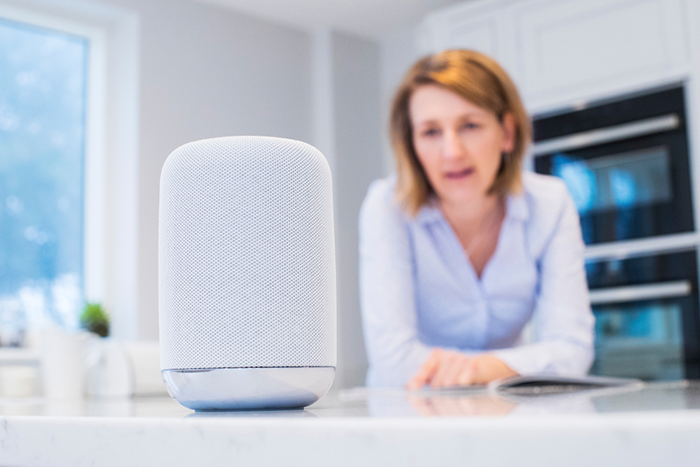Have you ever asked Siri a question?
How about another artificial intelligence (AI) assistant like Alexa, Cortana, or Google Assistant?
Whether you answered yes or no, the fact is…
The majority of your potential customers have spoken a command or question to one of these virtual assistants.
They’ve asked questions like…
“Siri, is it going to rain today?”
“Alexa, where’s the nearest coffee shop?”
And even…
“OK, Google. Who’s the best plumber in Santa Clarita?”

Mobile voice search results for “Siri, who is the best plumber in Santa Clarita?”
So what does this mean for your home services business?
It means technology is CHANGING the way modern-day customers are looking for local products and services like the ones you offer.
Research shows that of consumers who currently use voice search, nearly half (46%) use it daily to find a local business.
And by 2020, voice search will account for half of all online searches.
So the bottom line is:
Your business can’t afford to ignore voice search.

Your prospective customers are already conducting these searches on their smartphones, smartwatches, smart speakers, and other devices for their various needs.
It’s only a matter of time before they need a business like yours and decide to turn to Siri or another AI assistant for fast, easy answers.
The question to ask yourself is: “Will your business get found?”
If you’re not sure, then it’s time to take action!
To help you make your business easier to find in voice search results (and get noticed at the time when everyone’s competing for the spotlight online), we’ve provided a few helpful tips. Below are three things to consider when optimizing your company’s online presence, as well as five strategies you can start applying today.
Voice search optimization: 3 points to consider
1. Natural language
People use more conversational queries when conducting a voice search. For example, they’re more likely to ask “What time does Mr. Rooter open today?” instead of “Mr. Rooter office hours.” So make sure to include more natural-language terms to your keywords list. These types of queries are known as “long-tail” keywords. They’re longer in length (typically around seven words compared to about three), and they tend to take the form of phrases and questions.
2. Device
Be aware of the types of devices your potential customers are using to conduct voice searches, and optimize your online presence for these devices. While voice searches are common on smart speakers, research indicates that the majority of these searches are performed on handheld devices like smartphones and smartwatches.
3. Locale
People looking for something local (like a local business) are 3X more likely to conduct a voice search (specifically on a mobile device) than a text-based search. What does that mean for your business? It means you need to be on top of your local digital marketing (like your local SEO and online reputation) if you want your business to get found in more searches by potential customers. (See Strategy #4 below.)

5 strategies you can apply today
Strategy #1—Post an FAQ page.
People typically conduct voice searches in the form of questions.
(“Siri, how do you fix a leaking faucet?”)
(“Alexa, what’s a ductless HVAC system?”)
By posting an FAQ page for the most common questions customers are asking, you make it easier for your business’ website to get featured in voice search results.
To increase your visibility in voice searches, keep your answers brief. The average Google voice search result is 29 words long, so keep the root of your answer short.
(Example: the last two sentences together are exactly 29 words long.)
Strategy #2—Make your content easy to understand.
When Google pulls results for voice searchers, it’s trying to find content that the average consumer can understand.
So don’t try to show off by filling your website with the smartest-sounding vocabulary words you know.
Keep your web content at a 9th-grade reading level or lower (this is the average for Google voice searches), and make sure your site easy to understand for all your visitors.
Strategy #3—Work on your SEO.
Did you know the websites that rank the highest in desktop searches have a better chance of getting found in voice searches as well?
About 75% of all voice search results come from web pages that rank in the top three positions in “regular” searches.
So make keep plugging away at your search engine optimization (SEO)!
Strategy #4—Make your business info accessible.
Think about the type of information customers might want to know about your business when they’re thinking of using your services.
They might want to know your...
- Address
- Phone number
- Hours of operation
- Customer ratings and reviews
And virtual assistants like Siri are the fastest and most convenient way to get that information. So make sure this information is readily available on your website, blog, and online business listings (like Yelp or Google My Business).
Strategy #5—Invest in Google Local Search Ads (LSAs)
In addition to regular pay-per-click ads, Google now also offers Local Search Ads (LSAs) at the top of its search results.
LSAs allow potential customers to learn about local, Google-verified home services businesses and even request service directly through the ad.
If you’re currently investing in these ads for your business, here’s some good news—you should automatically experience a boost in your voice search visibility as a result! If you aren’t using these ads, you may want to them, as they can bring you more business in both voice- and text-based searches.
The time to prepare is NOW
Don’t miss out on potential jobs because you weren’t prepared with a voice search strategy.
Act now to ensure your home services business if visible no matter how your prospective clients are searching—whether that’s on a desktop using text-based search or on a smartwatch using Siri or Alexa.

Want to learn more about how to attract more customers to your home services business in today’s digital age?
This blog is PART 4 in our series on the state of Internet marketing for homeservices business.
Click here to read part 1, part 2, or part 3.
And if you have any questions about how you can improve your business’ digital marketing strategy, call (866) 616-0824 or message us here.



